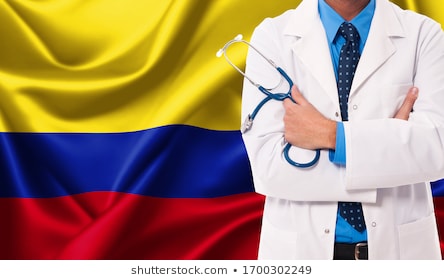Health disparities in Colombia
A recent study conducted by the London School of Economics revealed that Afro-Colombians are at an extreme disadvantage in terms of being healthy when compared to the rest of the Colombian population. Furthermore, this study showed that many socio-economic factors are involved in this and that contribute to such disparities. For example, the fact that Afro-Colombians are much poorer than the rest of the Colombian population is one of the main reasons that they are in a position of disadvantage when it comes to seeking health care services and being healthy in general. This is supported by their findings that showed that just under 5% of Afro-Colombians have medical insurance, compared to almost 30% of all non-Afro Colombians. Additionally, they found that most Afro-Colombians live in unsanitary conditions that increase exposure to a large variety of diseases as well as a common trend among Afro-Colombian children with bad health. This is often due to uneducated mothers.[32]
Health inequality has negatively affected many minorities in Colombia; particularly those from a very low socioeconomic status such as Afro-Colombians. In comparison with the indigenous populations in Colombia, Afro-Colombians are at a greater disadvantage when it comes to access to health care.
Research from 2003 shows that 53.8% of blacks did not have access to health insurance compared to 37.9% of the indigenous population. Only 10.64% of Afro-Colombians were affiliated to the subsidized regime in comparison with most of the indigenous population. Moreover, 65.8% vs. 74.6% of non-minorities groups characterized their health status as very good and good while 30.7% vs. 22.7% of indigenous and Afro-Colombians described it as fair and 3.5% vs. 2.8% as poor. This reveals the health disparities among minority groups in Colombia in comparison with the rest of the population.[33]
Researchers have found that the adult Afro-Colombian population is less likely to be described as being in good health compared to the rest of the population. They are also more likely to report that they are sick and are dealing with chronic issues. This population is also less likely to obtain treatment if they are sick. Nevertheless, when they do look for medical treatment, they tend to receive it in the same numbers as non-Afro-Colombians. These results are not just explained by disadvantages in socioeconomic status, health insurances, or educational level, but by the discrimination that Afro-Colombians experience in their daily lives. Even when health insurance is given for free, Afro-Colombians are far less likely to be enrolled and this can be explained by structural and internalized discrimination.[34]
PLEASE ADD DROP DOWN MANUE HERE
References: Raizals
Main article: Raizal
The Raizal ethnic group is an Afro-Caribbean group living in Archipelago of San Andrés, Providencia, and Santa Catalina, speaking the San Andrés-Providencia Creole.
Notable Afro-Colombians]
Juan José Nieto Gil, first and only President of the Republic with known Afro-Colombian ancestry.
Luis Antonio Robles Suárez, first Afro-Colombian lawyer and politician.
Joe Arroyo, Salsa singer, songwriter, and composer.
Benkos Biohó, founder of San Basilio de Palenque.
Junior Jein, Afro-Colombian hip-hop artist.
Caterine Ibargüen, athlete
Faustino Asprilla, footballer
Éder Álvarez Balanta, footballer
Jacob Bush (DJ Buxxi), producer/composer/singer from San Andrés.
Vanessa Alexandra Mendoza Bustos, Miss Colombia 2001 winner and fashion model
Piedad Córdoba, politician
ChocQuibTown, Afro-Colombian hip-hop group.
Antonio Cervantes, boxer from San Basilio de Palenque
Juan Cuadrado, footballer
Cristián Zapata, footballer
Raul Cuero, scientist
Kombilesa Mí, Afro-Colombian hip-hop group.
Alfredo Morelos, footballer
Jackson Martínez, footballer
Yerry Mina, footballer
Luis Alberto Moore, police brigadier-general
Luis Gilberto Murillo, politician
Manuel Zapata Olivella, writer
Édgar Rentería, Major League Baseball player
Freddy Rincón, footballer
Elkin Robinson, musician/composer/producer from Providence
Davinson Sánchez, footballer
María Isabel Urrutia, first Olympic gold medal winner for the country
Óscar Figueroa, weightlifter
Carlos Valderrama, footballer
Jealisse Andrea Tovar Velásquez, Miss Colombia 2015 winner and fashion model
Paula Marcela Moreno Zapata, politician
Antumi Toasijé, historian and activist
Candelario Obeso, Afro-Colombian author, journalist, engineer
See also
- Colombia portal
- Afro-American peoples of the Americas
- Afro-Latin Americans
- Mestizo Colombians
- Race and ethnicity in Colombia
- White Colombians
References
- ^Colombia: People 2019, CIA World Factbook
- ^”African Origins of AfroColombian Lastnames” (PDF). Clopedia Afrocolombiana. Archived from the original (PDF) on 11 June 2016. Retrieved 22 May 2016.
- ^”African Origins of AfroColombians”. AfroColombia NY. Archived from the original on 8 April 2016. Retrieved 22 May 2016.
- ^ Jump up to:ab “Afro-Colombians”. Minority Rights Group. Retrieved 15 September2020.
- ^”afro colombians armed actors – Google Search”. www.google.com. Retrieved 17 September 2020.
- ^Gilberto Murillo, Luis (23 February 2001). “El Chocó: The African Heart of Colombia”. Columbian Human Rights Network. Retrieved 9 October 2016.
- ^Fundación Hemera (2007). “Ethnic groups: Afro-Colombians”. Ethnicities of Colombia (in Spanish). Archived from the original on 22 February 2008. Retrieved 29 December 2007.
- ^”Who is Indigenous? Who is Afro-Colombian? Who Decides?”. www.culturalsurvival.org. Retrieved 15 September 2020.
- ^”La visibilización estadística de los grupos étnicos colombianos” [The statistical visibility of Colombian ethnic groups] (PDF). Colombian National Administrative Department of Statistics (in Spanish). 2006. Retrieved 9 October 2016.
- ^”Perfil: Censo General 2005″ [Profile: General Census 2005] (PDF). Colombian National Administrative Department of Statistics (in Spanish). 14 September 2010. Retrieved 9 October 2016.
- ^ Jump up to:ab “Colombia | History, Culture, & Facts”. Encyclopedia Britannica. Retrieved 16 September 2020.
- ^ Jump up to:ab Salazar, Hernando (25 May 2007). “¿Colombia hacia la integración racial?” [Is Colombia moving toward racial integration?] (in Spanish). BBC.com.uk. Retrieved 9 October 2016.
- ^Varney, John (2001). “An Introduction to the Colombian Bambuco”. Latin American Music Review. 22 (2): 123–156. doi:1353/lat.2001.0017. ISSN 1536-0199.
- ^ Jump up to:ab c Isaacs, Jorge (2016). Maria. [CreateSpace Independent Publishing Platform]. ISBN 9781537512471. OCLC 1040595091.
- ^Lippincott’s Gazetteer of the World. A complete pronouncing Gazetteer … New edition … enlarged, etc. J.B. Lippincott & Co. 1880. OCLC 560816137.
- ^ Jump up to:ab Hoffmann, Odile (4 June 2015), “Capítulo 2. La región del pacífico. Entre “marginalidad” y “particularidad””, Comunidades negras en el Pacífico colombiano : Innovaciones y dinámicas étnicas, Travaux de l’IFEA (in Spanish), Institut français d’études andines, pp. 51–62, ISBN 9782821844407, retrieved 1 March 2019
- ^Gardiner, C. Harvey (April 1954). “Colonial Placer Mining in Colombia. By Robert C. West. (Baton Rouge: Louisiana State University Press, 1952. Pp. x, 157. $3.00.)”. The Americas. 10 (4): 506–507. doi:2307/977703. ISSN 0003-1615. JSTOR 977703.
- ^Davila, Deisy (2005), Carnaval, Cumbia and Queens: Representations of Blackness, Studies in Symbolic Interaction, 28, Emerald (MCB UP ), pp. 127–171, doi:1016/s0163-2396(04)28014-0, ISBN 9780762311866
- ^CALLE, Sebastián Restrepo; Medina, Diego Pérez (2018), “Introducción”, En diálogo con la tierra. Por una Colombia sostenible, Editorial Universidad del Rosario, pp. 25–29, doi:2307/j.ctv11wjh4.5, ISBN 9789587840063
- ^ Jump up to:ab Aidi, Hisham (18 July 2015). “Afro-Colombians face surge in racial violence”. Aljazeera. Retrieved 16 October 2018.
- ^”Cátedra De Estudios Afrocolombianos.” Afrocolombianidad y Educacion Como Poltica De Estado – Ministerio De Educacion Nacional De Colombia, https://www.mineducacion.gov.co/1621/article-87286.html
- ^”Afrocolombianidad y Educación Como Política De Estado.” Afrocolombianidad y Educacion Como Poltica De Estado – Ministerio De Educacion Nacional De Colombia, https://www.mineducacion.gov.co/1621/article-208086.html
- ^ Jump up to:ab c “Afro-Colombians”. Minority Rights Group International. Retrieved 16 October 2018.
- ^ Jump up to:ab Robinson, Lori S. “Fighting for Black Lives in Colombia: At War’s End, the Search for a Seat at the Table.” The Root, The Root, 3 July 2017, www.theroot.com/fighting-for-black-lives-in-colombia-at-war-s-end-the-1796521962.
- ^Castro, Fatimah Williams. “Afro-Colombians and the Cosmopolitan City: New Negotiations of Race and Space in Bogotá, Colombia.” Latin American Perspectives, vol. 40, no. 2, 2013, pp. 105–117. JSTOR, https://www.jstor.org/stable/23466025.
- ^Castro, Fatimah Williams. “Afro-Colombians and the Cosmopolitan City: New Negotiations of Race and Space in Bogotá, Colombia.” Latin American Perspectives, vol. 40, no. 2, 2013, pp. 105–117. JSTOR, www.jstor.org/stable/23466025.
- ^Soendergaard, Maren. “How Political Exclusion Affects Colombia’s Afro-descendant Minority.” Colombia News | Colombia Reports, 26 Feb. 2015, https://colombiareports.com/afro-colombian-political-exclusion-effects-social-indicators/.
- ^Hernández, Tanya Katerí. “Revealing the Race-Based Realities of Workforce Exclusion.” NACLA, 9 Feb. 2015, https://nacla.org/article/revealing-race-based-realities-workforce-exclusion/.
- ^Castro, Fatimah Williams. “Afro-Colombians and the Cosmopolitan City: New Negotiations of Race and Space in Bogotá, Colombia.” Latin American Perspectives, vol. 40, no. 2, 2013, pp. 105–117. JSTOR, www.jstor.org/stable/23466025
- ^”El 25% de la población Afro-Colombian en Quindío es esplanade por la violencia”. Caracol Armenia. Retrieved 16 October 2018.
- ^Dedios, Maria Cecilia (31 October 2017). “Poor health outcomes amongst Afro-Colombians are driven by discrimination as well as economic disadvantage”. London School of Economics. Retrieved 16 October 2018.
- ^Bernal, Raquel, and Mauricio Cárdenas. “Race and ethnic inequality in health and health care in Colombia.”https://www.repository.fedesarrollo.org.co/bitstream/handle/11445/811/WP_2005_No_29.pdf?sequence=1&isAllowed=y (2005).
- ^Dedios, María C. “Poor Health Outcomes amongst Afro-Colombians Are Driven by Discrimination as Well as Economic Disadvantage.” LSE Latin America and the Caribbean, 1 Nov. 2017, https://blogs.lse.ac.uk/latamcaribbean/2017/10/31/poor-health-outcomes-amongst-afro-colombians-are-driven-by-discrimination-as-well-as-economic-disadvantage/.
afro-Colombians José Mina Ocoro Artista Painter
Afro-Colombian Solidarity Network <http://www.afrocolombian.org>AfroColombiany.org Afro-Colombian News in English.
CNN video of Afro-Colombian community
Colombian 2005 Census Television Commercial Orgullosamente Afrocolombiano
The World Bank’s Sector Report “The Gap Matters: poverty and well-being of Afro-Colombians and indigenous peoples” Click here for the report
African-Diasporic Regions of Colombia plus more COLOMBIAFRICA
Documentary 150 years after abolition Libertad En Colombia (Liberty In Colombia)
Colombia contra el racismo
“Law 70: English Translation of Ley 70”
Afro-Colombian
Colombian society
Colombian people of African descent

